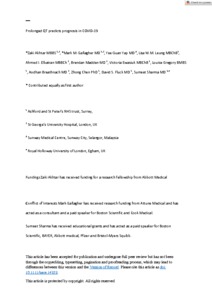Akhtar, Z;
Gallagher, MM;
Yap, YG;
Leung, LWM;
Elbatran, AI;
Madden, B;
Ewasiuk, V;
Gregory, L;
Breathnach, A;
Chen, Z;
et al.
Akhtar, Z; Gallagher, MM; Yap, YG; Leung, LWM; Elbatran, AI; Madden, B; Ewasiuk, V; Gregory, L; Breathnach, A; Chen, Z; Fluck, DS; Sharma, S
(2021)
Prolonged QT predicts prognosis in COVID-19.
Pacing Clin Electrophysiol, 44 (5).
pp. 875-882.
ISSN 1540-8159
https://doi.org/10.1111/pace.14232
SGUL Authors: Gallagher, Mark Michael
![[img]](https://openaccess.sgul.ac.uk/113132/1.hassmallThumbnailVersion/pace.14232.pdf)  Preview |
|
PDF
Accepted Version
Available under License ["licenses_description_publisher" not defined].
Download (1MB)
| Preview
|
Abstract
BACKGROUND: COVID-19 causes severe illness and multi-organ dysfunction. An abnormal electrocardiogram is associated with poor outcome, and QT prolongation during the illness has been linked to pharmacological effects. This study sought to investigate the effects of the COVID-19 illness on the corrected QT interval (QTc). METHOD: For 293 consecutive patients admitted to our hospital via the emergency department for COVID-19 between 01/03/20 - 18/05/20, demographic data, laboratory findings, admission electrocardiograph and clinical observations were compared in those who survived and those who died within 6 weeks. Hospital records were reviewed for prior electrocardiograms for comparison with those recorded on presentation with COVID-19. RESULTS: Patients who died were older than survivors (82 vs 69.8 years, p<0.001), more likely to have cancer (22.3% vs 13.1%, p = 0.034), dementia (25.6% vs 10.7%, p = 0.034) and ischaemic heart disease (27.8% vs 10.7%, p<0.001). Deceased patients exhibited higher levels of C-reactive protein (244.6mg/L vs 146.5mg/L, p<0.01), troponin (1982.4ng/L vs 413.4 ng/L, p = 0.017), with a significantly longer QTc interval (461.1ms vs 449.3ms, p = 0.007). Pre-COVID electrocardiograms were located for 172 patients; the QTc recorded on presentation with COVID-19 was longer than the prior measurement in both groups, but was more prolonged in the deceased group (448.4ms vs 472.9ms, pre-COVID vs COVID, p<0.01). Multivariate Cox-regression analysis revealed age, C-reactive protein and prolonged QTc of >455ms (males) and >465ms (females) (p = 0.028, HR 1.49 [1.04-2.13]), as predictors of mortality. QTc prolongation beyond these dichotomy limits was associated with increased mortality risk (p = 0.0027, HR 1.78 [1.2-2.6]). CONCLUSION: QTc prolongation occurs in COVID-19 illness and is associated with poor outcome. This article is protected by copyright. All rights reserved.
| Item Type: |
Article
|
| Additional Information: |
This is the peer reviewed version of the following article: Akhtar, Z, Gallagher, M, Yap, YG, et al. Prolonged QT predicts prognosis in COVID‐19. Pacing Clin Electrophysiol. 2021; 44: 875– 882, which has been published in final form at https://doi.org/10.1111/pace.14232. This article may be used for non-commercial purposes in accordance with Wiley Terms and Conditions for Use of Self-Archived Versions. |
| Keywords: |
COVID-19, Electrocardiogram, Sars-Cov-2, mortality, prolonged QTc, 0903 Biomedical Engineering, 1103 Clinical Sciences, Cardiovascular System & Hematology |
| SGUL Research Institute / Research Centre: |
Academic Structure > Molecular and Clinical Sciences Research Institute (MCS) |
| Journal or Publication Title: |
Pacing Clin Electrophysiol |
| ISSN: |
1540-8159 |
| Language: |
eng |
| Publisher License: |
Publisher's own licence |
| PubMed ID: |
33792080 |
| Dates: |
| Date |
Event |
| 2021-05-08 |
Published |
| 2021-04-13 |
Published Online |
| 2021-03-21 |
Accepted |
|
 |
Go to PubMed abstract |
| URI: |
https://openaccess.sgul.ac.uk/id/eprint/113132 |
| Publisher's version: |
https://doi.org/10.1111/pace.14232 |
Statistics
Item downloaded times since 07 Apr 2021.
Actions (login required)
 |
Edit Item |



